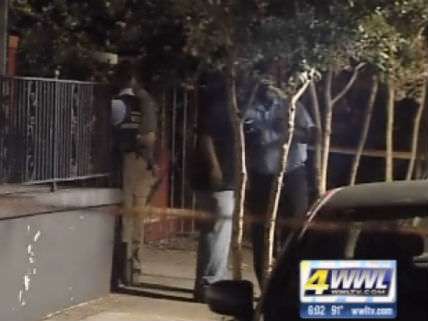New Orleans Man Arrested for Attempted Murder After Shooting Burglar

On Friday a New Orleans homeowner was arrested for attempted second-degree murder after shooting a teenager who had climbed over his fence in the middle of the night. Merritt Landry, who works as a building inspector for the city's Historic District Landmarks Commission, said he believed Marshall Coulter, a 14-year-old with a history of burglary arrests, was about to break into his home. Awakened by his dog's barking, Landry went outside to see what was going on and saw Coulter in his driveway a few feet from his back door. Landry said that as he approached Coulter the teenager made a "move, as if to reach for something." Landry said he fired at that point, fearing that Coulter had a weapon. But police said Coulter, who was struck in the head and critically wounded, was unarmed and did not pose the sort of "imminent threat" that would justify the use of deadly force. Based on where they found blood and a shell casing, they estimated that Landry shot Coulter from a distance of about 30 feet.
Neighbors told the New Orleans Times-Picayune that Landry, who has a pregnant wife and a baby daughter, was merely trying to protect his family. Coulter's 23-year-old brother, David Coulter, admitted that Marshall had a history of "stealing stuff," calling him a "professional thief." But he said Marshall "would never pick up a gun, not in a million years." He added:
He's still a little boy. Who pulls a trigger on a 14-year-old? What if it was your little brother or your sister? How would you feel?
Landry, of course, was in no position to know Marshall Coulter's age, criminal history, or attitude toward firearms. And under Louisiana law, it seems he was within his rights to shoot the intruder. The Louisiana statute governing the "use of force or violence in defense" says "there shall be a presumption that a person lawfully inside a dwelling, place of business, or motor vehicle held a reasonable belief that the use of force or violence was necessary to prevent unlawful entry thereto, or to compel an unlawful intruder to leave the premises or motor vehicle" if "the person against whom the force or violence was used was in the process of unlawfully and forcibly entering or had unlawfully and forcibly entered the dwelling, place of business, or motor vehicle" and "the person who used force or violence knew or had reason to believe that an unlawful and forcible entry was occurring or had occurred." A homicide likewise is considered justified "when committed by a person lawfully inside a dwelling, a place of business, or a motor vehicle…against a person who is attempting to make an unlawful entry into the dwelling, place of business, or motor vehicle, or who has made an unlawful entry into the dwelling, place of business, or motor vehicle, and the person committing the homicide reasonably believes that the use of deadly force is necessary to prevent the entry or to compel the intruder to leave the premises or motor vehicle."
So why was Landry arrested? Det. Nicholas Williams asserted in the arrest warrant that Coulter was not trying to enter Landry's house when he was shot. But this "professional thief" had hopped Landry's fence at 2 a.m. and was a few feet from the back door. If he had closed that distance and put his hand on the door knob before being shot, would that have made Landry's use of force justified?
Louisiana, by the way, has a "stand your ground" law, adopted in 2006, and at least one change made that year is relevant in this case. The main change, as in Florida, was a provision stating that "a person who is not engaged in unlawful activity and who is in a place where he or she has a right to be shall have no duty to retreat before using deadly force [when justified by a reasonable fear of death or serious injury] and may stand his or her ground and meet force with force." But even prior to 2006, the Times-Picayune notes, people facing intruders at home had no duty to retreat and were authorized to use force, including deadly force, if they reasonably believed it was necessary to "prevent the entry or to compel the intruder to leave the premises." The 2006 law, also as in Florida, strengthened the right to self-defense in the home by creating a presumption that the use of force is reasonable in that setting.
[Thanks to David Kervin for the tip.]
